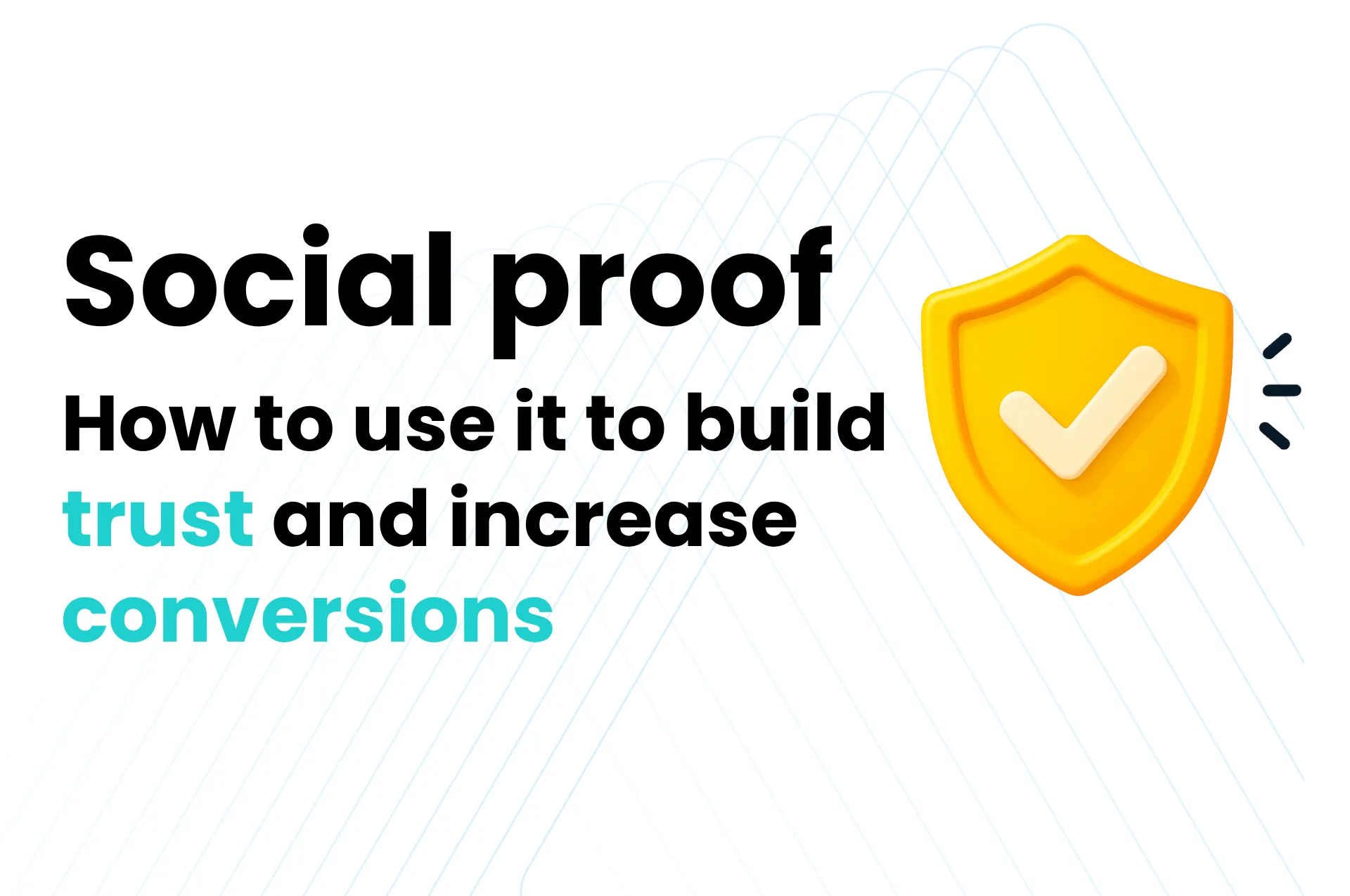What is social proof? And how can you use it to build trust and increase conversions?
When people are uncertain, they look to others for guidance. This fundamental human behavior is known as social proof. In marketing, social proof is a powerful psychological principle used to build trust, influence decisions, and increase conversions. Whether it's product reviews, influencer endorsements, or live customer activity notifications, social proof reassures potential buyers that choosing your brand is the right move.

What is social proof? And how can you use it to build trust and increase conversions?
When people are uncertain, they look to others for guidance. This fundamental human behavior is known as social proof. In marketing, social proof is a powerful psychological principle used to build trust, influence decisions, and increase conversions. Whether it's product reviews, influencer endorsements, or live customer activity notifications, social proof reassures potential buyers that choosing your brand is the right move.
The psychology and behavioral economics of social proof
The concept of social proof was popularized by psychologist Robert Cialdini in his influential book Influence: The Psychology of Persuasion. According to Cialdini, people tend to follow the actions of others, especially when they are unsure of what to do. This behavior is rooted in our evolutionary need to conform to social groups for safety and belonging.
But Cialdini wasn't alone in uncovering the mechanisms behind social influence. Daniel Kahneman and Amos Tversky, through their groundbreaking work in behavioral economics, especially their Prospect Theory, explained how people make decisions under uncertainty. One relevant bias they uncovered is the availability heuristic—the tendency to judge something as more likely or more valid if examples readily come to mind. Seeing others’ decisions serves as immediate and memorable input, influencing our perception of value and safety.
Richard Thaler, another Nobel laureate and a pioneer of behavioral economics, contributed significantly to understanding how people deviate from rational decision-making. In his work with nudge theory, Thaler emphasized that subtle cues can guide choices without restricting freedom—social proof is one such nudge. Showing that others are doing something can dramatically alter behavior without coercion.
Social proof reduces perceived risk and builds cognitive ease. When a prospective buyer sees others’ positive experiences, it eases their decision-making process by reducing uncertainty.
If you are interested in customer behavior check out our other articles too, by clicking the link!
Practical ways to use social proof in your marketing strategy
Here’s how to effectively implement social proof to build credibility and drive conversions:
1. Customer reviews and testimonials
Positive reviews and testimonials are among the most powerful forms of social proof. They provide real-life validation of your product or service.
Tip: Feature verified reviews prominently on your product pages, and include photos or names when possible to increase authenticity.
2. Influencer endorsements
Collaborating with relevant influencers helps build credibility with specific audience segments. Audiences trust recommendations from people they follow.
Tip: Choose influencers whose followers align with your target demographic, and focus on genuine, experience-based endorsements.
3. User-generated content (UGC)
Encouraging customers to share their experiences via social media helps create relatable, authentic proof that others love your brand.
Tip: Repost UGC on your brand’s channels and tag the original creators to strengthen community engagement.
4. Trust badges and certifications
Logos of payment processors, security certifications, or industry awards instill confidence in your brand’s reliability and legitimacy.
Tip: Place trust badges near your CTAs or checkout buttons to reduce hesitation.
5. Real-time activity notifications
Pop-ups that show real-time actions (e.g., “Someone in your city just purchased this item”) tap into the herd mentality and create urgency.
Tip: Use responsibly to avoid seeming spammy—ensure they're based on real activity.
6. Case studies and success stories
Detailed stories that show how a client benefited from your product add depth to your proof and address specific pain points.
Tip: Use metrics and visuals to illustrate the impact and keep it relatable.
7. Social media follower counts and engagement
Visible metrics like follower numbers, likes, and shares serve as signals that others value your brand.
Tip: Highlight authentic engagement over vanity metrics. It’s more effective to show meaningful interaction.
8. Testimonials on landing pages
Your landing page is often the first impression—embed video or written testimonials to immediately build trust.
Tip: Place testimonials close to your CTA buttons to strengthen conversion intent at the decision point.
9. Media mentions and PR highlights
Quoting or showcasing recognizable publications that have mentioned your brand lends authority and taps into reputational trust.
Tip: Use media logos with a "Featured in" section above the fold on your homepage.
Why social proof works: the science of trust
From a neurological perspective, seeing others validate a choice activates reward centers in the brain, similar to when we receive approval ourselves. Social validation is deeply wired into our psychology—it signals safety, belonging, and correctness. When we observe the crowd's behavior, our brains often assume it’s the right one, especially under ambiguity.
This makes social proof a low-friction tool for reducing buyer hesitation. Instead of needing exhaustive information or complex logic, a potential customer can rely on peer behavior as a shortcut to making a "safe" decision.
Conclusion
Social proof isn’t just a buzzword—it’s a scientifically backed, behavior-driven tool that marketers can use to create trust and accelerate conversions. Whether through reviews, influencer partnerships, or transparent customer activity, incorporating social proof builds a sense of shared experience and credibility.
Ready to harness the power of social proof to grow your business? Our team of digital marketing experts can help you integrate proven strategies that convert curiosity into trust and clicks into conversions. Get in touch with us today!